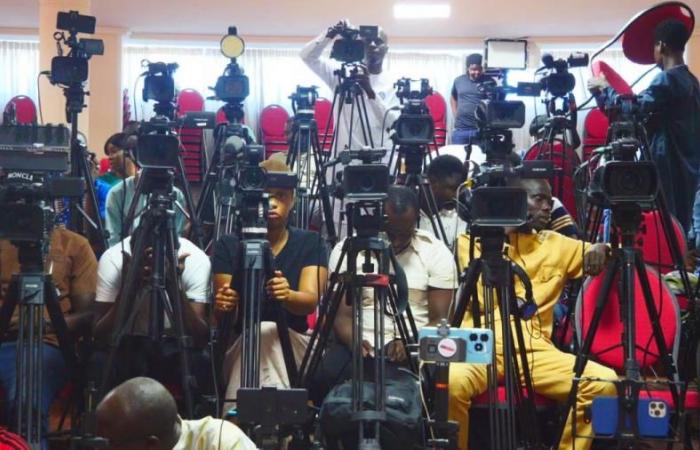Politicians, journalists and administrative authorities, all violate or are complicit in all-out violations of electoral law, under the passive gaze of the National Audiovisual Regulatory Council.
As if they have spread the word, this time, no stakeholder is making – even an effort – to respect the regulations on media coverage of the pre-campaign period leading up to the legislative elections of November 17, 2024 However, the electoral law is very clear. ”During the thirty days preceding the official opening of the electoral campaign, any disguised propaganda supported by the public and private national media is prohibited,” stipulates the electoral law.
It appears from the said text that, by act of disguised propaganda, we must understand ”any demonstration or public declaration of support for a candidate or a political party or coalition of political parties made directly or indirectly by any person or association or group of people whatever its quality, nature or character. The law is not limited to this. It equates ”with disguised propaganda or campaigns, visits and tours of an economic, social or otherwise qualified nature, carried out by all State authorities on the national territory and which give rise to such demonstrations or declarations”.
Responsible for ensuring strict compliance with these regulations, the National Audiovisual Regulatory Council (CNRA) has constantly issued warnings every day before elections. Year after year, some professionals tried to comply with it, even if the relevance of the provision has always been strongly questioned. In a press release dated September 19, the regulatory body, under the presidency of Babacar Diagne, sacrificed to this tradition, by recalling the legislative requirements. Through this press release, the media policeman specified that the pre-campaign for the Legislative Elections on November 17 extends from Friday September 27 at midnight to Saturday October 26 at midnight. The campaign will then begin during which the candidates will be able to carry out their activities freely, covered by the media while respecting the principles of fairness and balance.
But what happens if this rule is violated? The Electoral Code provides that ”in the event of contravention of this ban, the body responsible for media regulation must propose appropriate forms of reparation for the benefit of any candidate, any political party or coalition of political parties injured. The latter can directly file a complaint with the media regulatory body in the event of contravention of this ban. In other words, candidates who wish can, in principle, demand, from any media which exceeds these regulations, a repair of this imbalance in the treatment of the different protagonists.
In the past, the CNRA did not hesitate to issue press releases to remind everyone of the need to comply with the said code. ”Such actions, which expose the media concerned to the sanctions provided for by the regulations, cannot be tolerated,” he said to the recalcitrant media during the last Presidential election. For the present elections, it is rather a total carelessness. Each media does what it wants, without worrying about this ban which, in the past, hung like a sword of Damocles over the heads of purists. Even if, it must be clarified, certain non-conformists have always questioned the relevance of such a provision.
But what can we say about the political parties who generally draw up texts that they are sure they cannot respect?
In fact, according to many experts, during this pre-campaign period, what is prohibited is not the fact of organizing political activities, but rather the use of the media to ensure propaganda. Except that all political actors appeal to the media and are thus complicit in such violations. However, these texts are often the result of broad consensus between stakeholders.
During previous elections, certain administrative authorities, on the basis of an extensive interpretation of the law, did not hesitate to prohibit certain propaganda activities. However, they seemed to stigmatize the opposition parties who could not carry out their activities in the territory, at a time when the former ruling party could carry out without being disturbed. The same authorities today remain silent on the all-out violations of the electoral law in its articles L61 et seq.
In a statement made on Wednesday October 16, widely relayed by the media, the head of the Pastef/Les patriotes list met his activists at a ”giga-meeting” scheduled for Saturday 19 at the Dakar Arena in Diamniadio. Meanwhile, Bougane Guèye Dany from the Samm sa Kaddu list is almost always on the front page of certain media and will, with his coalition, host a press conference today. The same is true of the Alliance for the Republic, member of the Takku Wallu Senegal coalition, which is meeting the media this afternoon.
It should be remembered that with the changes that have taken place at the head of the National Audiovisual Regulatory Council, we are witnessing a sort of uncertainty which seems quite conducive to the reign of this disorder. That said, during his installation at the beginning of the week, the new president of the CNRA, known to be an irreverent and very free journalist, insisted on dialogue and mutual understanding, instead of sanction.
”I don’t want to be an audiovisual policeman. My role will be to encourage dialogue and understanding before any coercive intervention,” declared Mamadou Oumar Ndiaye. According to him, the sanction should only be applied as a last resort, after all other means of resolving disputes have been exhausted.
It remains to be seen whether this method will succeed.






